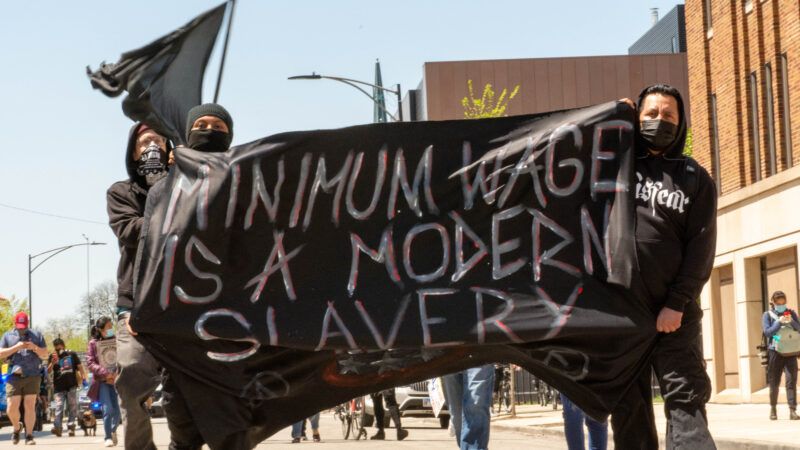New Study: Large Minimum Wage Hikes Especially Disadvantage Younger, Less Educated Workers
Taking advantage of variations in state minimum wage hikes, researchers find strong effects for bigger hikes, not much for smaller ones.

Younger, less-well-educated workers have been especially harmed by recent state-level minimum wage hikes, according to a study issued today by the National Bureau of Economic Research. The paper was written by economists Jeffrey Clemens of the University of California, San Diego, and Michael R. Strain of the American Enterprise Institute.
The supply-demand analysis at the heart of economics suggests that raising the price of labor would lead to lower demand for it, other things being equal. The past decade has provided particularly useful empirical data against which to test this notion.
"After the Great Recession [of the late 2000s], there was a pause in both state and federal efforts to increase minimum wages," the authors note. "This pause created a baseline (or 'pre-period') for empirical purposes. It was followed by considerable divergence in states' minimum wage policies. A number of states legislated and began to enact minimum wage changes that varied substantially in their magnitude. From January 2011 to January 2019, for example, Washington, D.C., California, and New York had increased their minimum wages by 61, 50, and 53 percent, respectively. Wage floors rose more moderately in an additional 24 states and were unchanged in the remainder." The past decade thus gave researchers a chance to compare the employment effects of "moderate minimum wage changes and historically large minimum wage changes" across U.S. states.
They found that "over the short and medium run, relatively large increases in minimum wages have reduced employment rates among individuals with low levels of experience and education by just over 2.5 percentage points." By contrast, smaller increases, or ones resulting from indexing inflation to wages, have effects that are "variable and centered on zero."
The data also offers "evidence that the medium-run effects of large minimum wage changes are larger and more negative than their short-run effects," so we will often need time to unfold before we see those bad employment effects blossom.
The changes the study analyzes were historically much larger than usual for state minimum wages, for both the small- and large-change states. Among their findings: By one data measure, "employment among individuals ages 16 to 25 with less than a completed high school education…expanded 4.0 percentage points less by 2019 in states that enacted large minimum wage changes than in states that enacted no minimum wage change." By another measure, it was 3.2 percentage points less.
In a series of tweets on his research, co-author Clemens notes that "relative declines are…particularly pronounced for our samples of individuals ages 16 to 25 with less than a completed high school education, but also present across all individuals ages 16 to 21."
While not claiming causation, the researchers did find that "the housing recovery following the Great Recession was quite strong in states that enacted relatively large minimum wage increases. Median house prices rose by roughly 49 percent in this group of states from the 2011–2013 base period through 2019….Across states that did not increase their minimum wage rates, house prices rose roughly 36 percent, and in states that enacted small minimum wage increases, median house prices rose by an average of roughly 31 percent." Meanwhile, "per capita incomes grew roughly $7,600 more in states that enacted relatively large minimum wage changes than in states that enacted no minimum wage changes."
But those macro outcomes in high-wage-hike states did not end up trickling down to low-skilled workers. Clemens believes, as per a tweet, that "growth in overall income, house prices, and high-skilled employment would have led you to predict larger employment gains for low-skilled individuals in the states that enacted large minimum wage increases. Instead, they experienced relative declines."
When it comes to minimum wage hikes designed to not harm younger workers with less education, then, larger definitely seems substantially worse than smaller.
